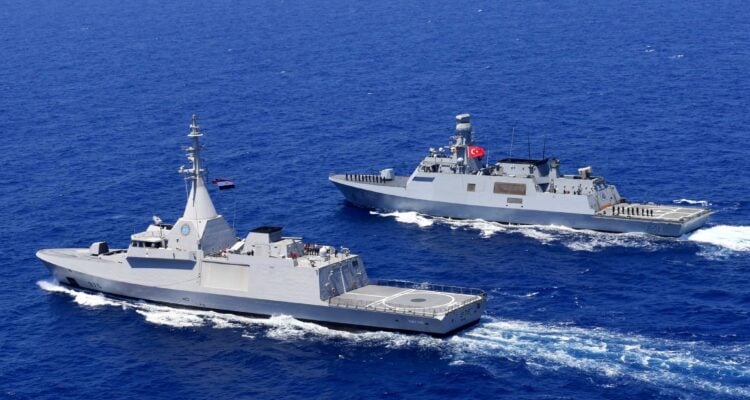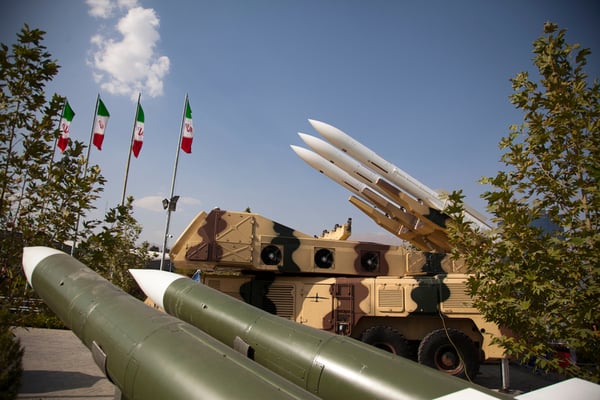
Turkey and Egypt holding massive joint naval drill encircling Israel
The Israeli Navy has increased patrols along its Mediterranean coastline and deployed reconnaissance aircraft to monitor the exercise in real time.
In a move that has stirred Israel’s unease, Turkey and Egypt are launching their first joint naval exercise in over a decade, staging a large-scale operation in the Eastern Mediterranean that effectively encircles Israel from both the north and south.
The drill, dubbed “Sea of Friendship,” runs from September 22 to 26, 2025, and includes a formidable array of military assets.
Turkey has deployed frigates TCG Oruçreis and TCG Gediz, patrol boats Imbat and Bora, the submarine TCG Gür, and F-16 fighter jets.
Egypt’s contribution includes its flagship ENS Tahya Misr and the Fouad Zekry, among other vessels.
Officially, the exercise is described as a step toward enhancing bilateral relations and improving mutual operability between the two nations.
However, its timing—just weeks after Israel intensified its military operations in Gaza—has led analysts to interpret it as a strategic signal.
Both Ankara and Cairo have publicly criticized Israel’s actions in Gaza, and their joint maneuver is widely seen as a show of regional alignment against Israel.
The location of the drill is particularly significant.
By spanning waters off Egypt’s northern coast and Turkey’s southern flank, the exercise places Israeli naval routes within a zone of heightened surveillance and potential pressure.
High-level observers from both navies attended the operation, underscoring the seriousness of the coordination and hinting at the possibility of deeper strategic ties between the two countries.
Israel has responded to the joint Egypt–Turkey naval drill with heightened vigilance and strategic recalibration.
The Israeli Navy has increased patrols along its Mediterranean coastline and deployed reconnaissance aircraft to monitor the exercise in real time.
Intelligence units are analyzing ship movements and communications to assess potential threats.
Defense officials have expressed concern over the drill’s symbolic encirclement, viewing it as a challenge to Israel’s maritime dominance.
Diplomatically, Israel has reached out to Washington and Athens to reinforce regional alliances and ensure freedom of navigation.
While avoiding direct confrontation, Israel is preparing contingency plans should the coordination evolve into hostile posturing.
Though framed as a gesture of friendship, the Sea of Friendship drill marks a notable shift in regional dynamics.
As tensions continue to simmer, Israel remains vigilant, aware that symbolic maneuvers can carry strategic weight.
Adding to Israel’s concerns is Egypt’s military buildup in the Sinai Peninsula.
Israeli intelligence estimates that Egypt has deployed nearly 40,000 troops—far exceeding the limits set by the 1979 peace treaty.
Satellite imagery reveals expanded airbases, underground bunkers, and suspected missile storage facilities.
While Egypt claims the buildup is defensive, aimed at preventing a potential influx of Palestinian refugees from Gaza, Israeli officials fear it could signal a shift in Cairo’s strategic posture.
The combination of Egypt’s Sinai militarization and its joint naval drill with Turkey suggests a coordinated regional stance that Israel cannot ignore.
Signs of the Times
Saudi Arabia warns Israel over annexation of Judea and Samaria

Such a move could also threaten the Abraham Accords, Israel’s normalization agreements with several Arab states.
Saudi Arabia has warned Israel that annexing any part of Judea and Samaria would carry “major implications in all fields,” Israeli media reported Sunday.
The warning coincided with a wave of new recognitions of a Palestinian state, with Portugal, the United Kingdom, Canada, and Australia all declaring support within the same day.
Riyadh did not specify what measures it might take, but Israeli officials believe normalization talks could collapse and Saudi airspace, first opened in 2022, could once again be closed to Israeli flights.
Such a move could also threaten the Abraham Accords, Israel’s normalization agreements with several Arab states.
Sources close to US President Donald Trump signaled that Washington does not favor annexation. “It’s the last thing they need,” one source said, citing already heightened tensions following Israel’s September 9 strike on Hamas leaders in Qatar.
Saudi officials are expected to meet Trump on the sidelines of the United Nations General Assembly this week, alongside leaders from the UAE, Qatar, Jordan, Egypt, and Turkey, to discuss the war in Gaza and postwar scenarios.
Trump will also hold a separate session with Gulf leaders focused on the Qatar strike.
In Jerusalem, Prime Minister Benjamin Netanyahu convened ministers to discuss how Israel should respond to the surge of international recognition.
Options included reclassifying parts of Judea and Samaria to expand Israeli authority and closing consulates of states that back a Palestinian state, particularly France.
Netanyahu, together with Strategic Affairs Minister Ron Dermer, stressed the need for close coordination with Washington. “No decision will be made until after my meeting with President Trump next week,” Netanyahu said in a video statement.
European diplomats urged restraint, warning that annexation would be seen as “collective punishment” and could jeopardize existing regional agreements. “We will not take annexation lying down,” one senior European official told Israel.
Gog and Magog Update
Iran tests new intercontinental missile, warns of ‘deadly’ response to foreign intervention

Iran reportedly tests advanced new missiles, threatens to use “deadly” force against its enemies.
Iran threatened to use “deadly” force should its enemies take action against it, following secret missile tests which an Iranian lawmaker claimed featured a new intercontinental missile.
On Sunday, Iran’s paramilitary Islamic Revolutionary Guard Corps (IRGC) issued an ominous statement, vowing to respond with force to any attack.
“If the enemy makes mistakes, Iran’s hand will be on top,” the IRGC said. “Iran will seize the initiative on the battlefield and respond in a deadly and instructive way once again.”
Just days earlier Iran is said to have conducted missile tests outside of Tehran.
Mohsen Zanganeh, a member of the Iranian parliament, told state media on Saturday that the recent tests included “advanced missiles” which have never been used before.
“Two nights ago, we tested one of the most advanced missiles in the country, a missile that had never been tested before, and the test was successful,” Zanganeh said.
“I mean, even under the current circumstances, we are conducting what’s essentially a security test of an intercontinental missile.”
Zanganeh emphasized that the test was conducted despite pressure from the United States on Iran to drop its ballistic missile program, and amid “tensions with Israel.”
The reports of missile tests come as the United Nations and European powers moved to restore sanctions on Iran which had been lifted under the 2015 nuclear deal.
Last month, the UK, France, and Germany triggered snapback sanctions on Iran, citing Tehran’s refusal to abide by the terms of the 2015 deal.
Separately, United Nations sanctions are set to automatically snapback after the Security Council failed Friday and Saturday to pass resolutions extending the sanctions relief.
Iranian President Masoud Pezeshkian responded to the impending restoration of sanctions, which are slated to return in force at the end of this week.
“Through snapback they block the way, but minds are what open it,” Pezeshkian said. “They can attack our nuclear facilities in Natanz or Fordo, but they do not understand that those who built and will rebuild them are human beings.”